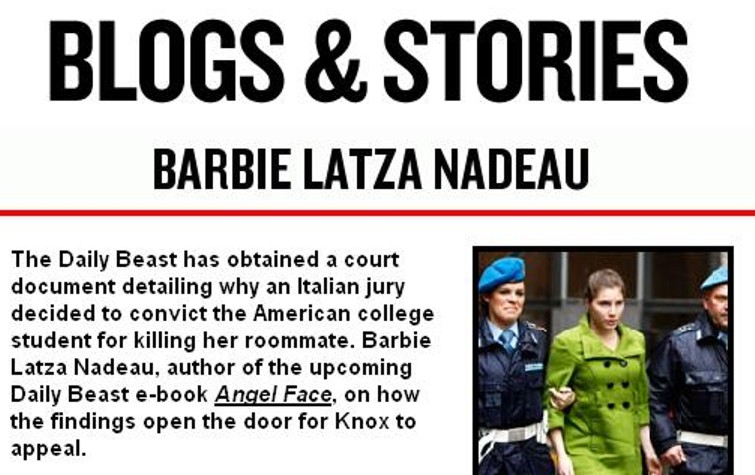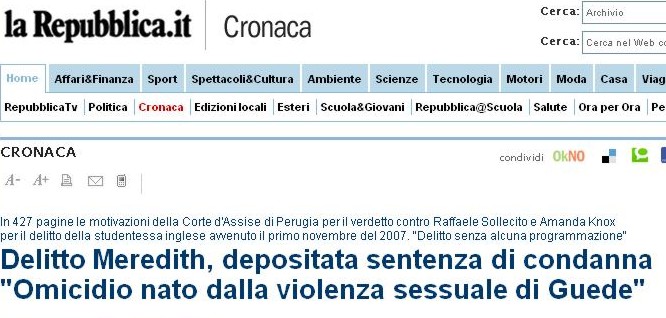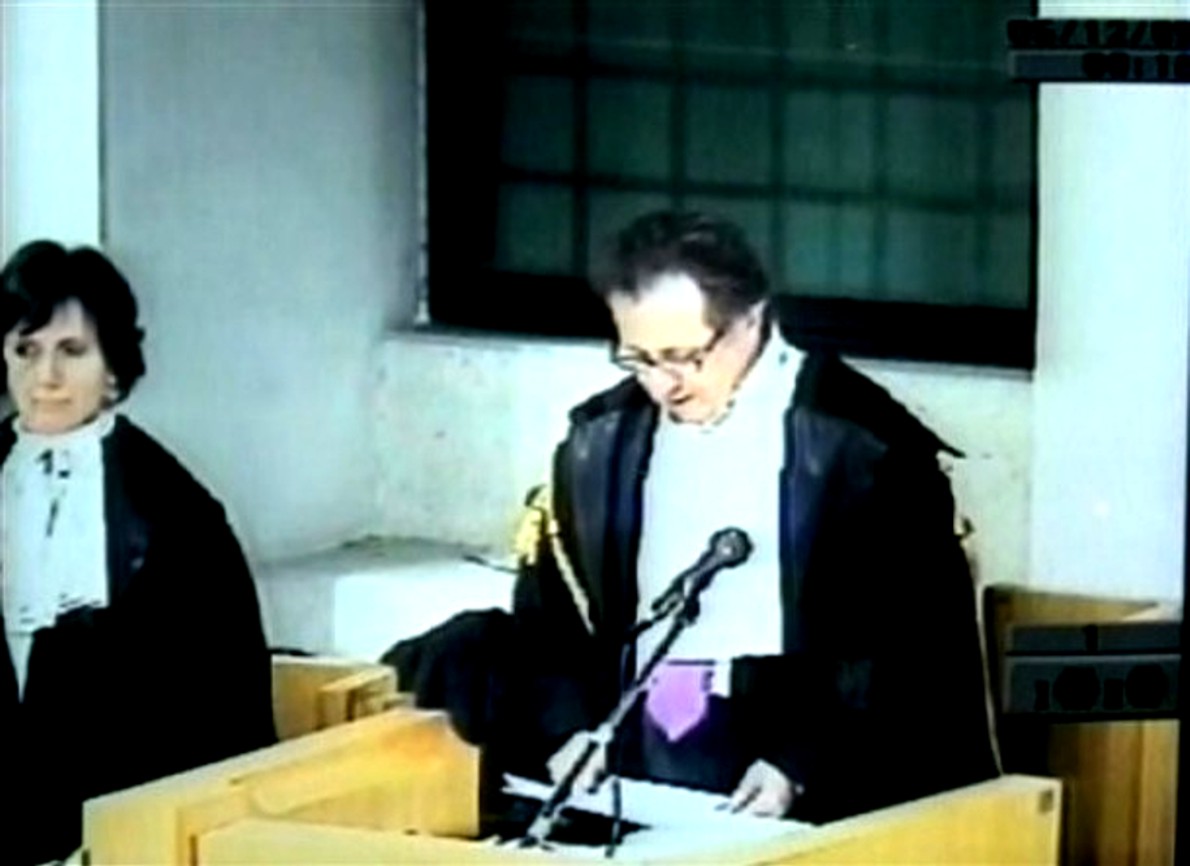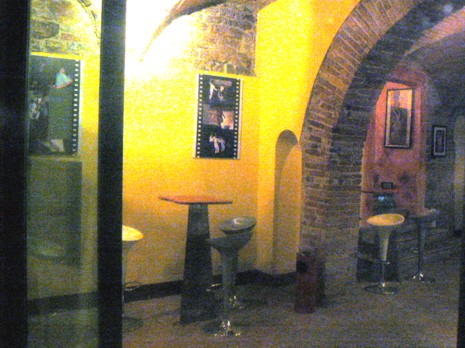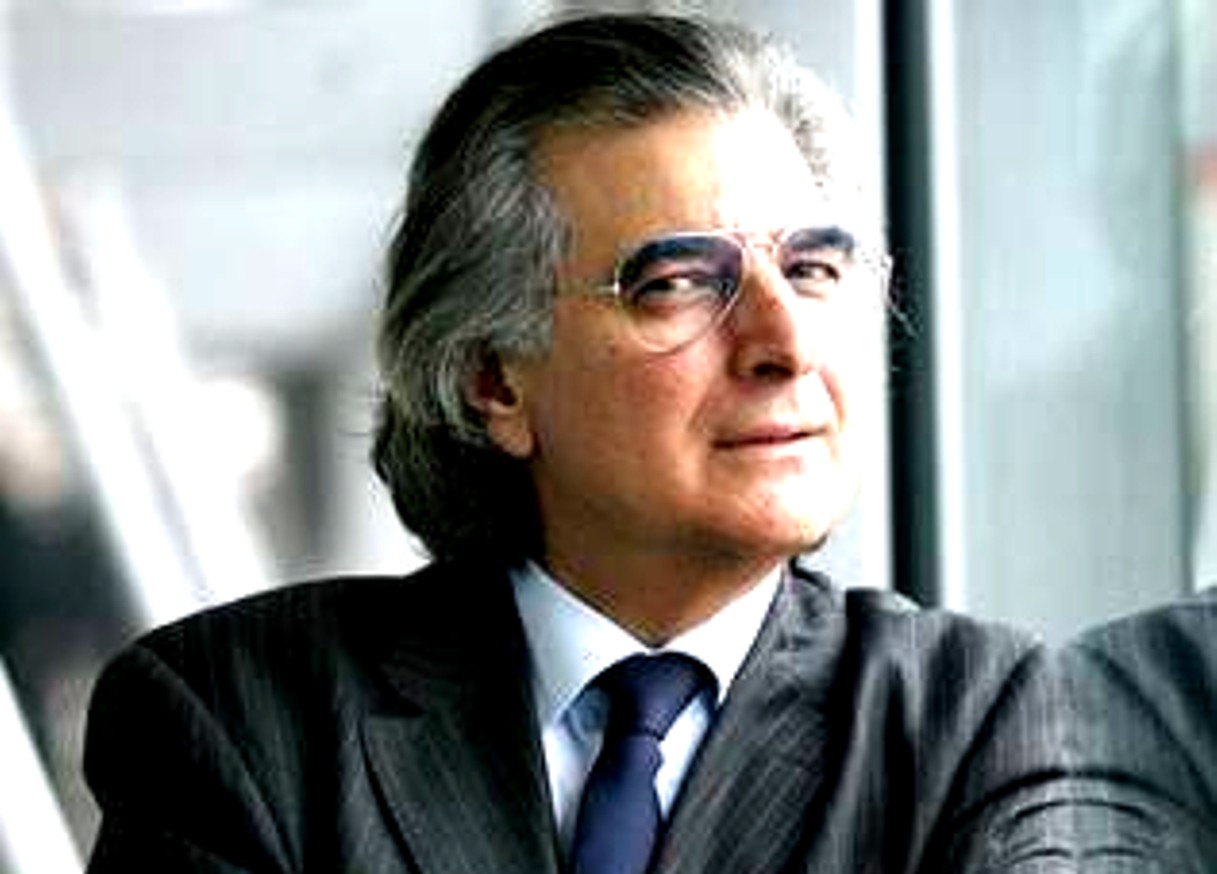
Headsup: To those many lawyers amazed that Knox did not get on the witness stand to head off a certain re-conviction: the best guess among Italian lawyers is that Knox's own lawyers feared ANOTHER calunnia charge if she repeated the crackpot and highly disprovable claims that she was tortured. The tough calunnia law is primarily a pushback measure against mafia meddling which is widely suspected in this case.
Thursday, March 04, 2010
Sentencing Report: Barbie Nadeau Quotes The Motive, Physical Evidence, And Alibis
Posted by Peter Quennell
Please click above for Barbie Nadeau’s full report on the Daily Beast website. Key excerpts.
1) The motive
“One can hypothesize that the bad decision came after the consumption of stupefying substances.”
But they disagreed on the motive. The prosecution lawyers began their case in January, 2009 by arguing that Kercher was killed during a sex game gone awry. By closing arguments, they had changed the theory slightly, trying to make the case that Knox resented her prissy British roommate and killed her in hatred. The jury rejected both theories, and the reasoning document declares that “the killing was carried out with no planning, no animosity and no revenge against the victim.
“The two young lovers, interested in each other and in the intellectual and cultural world around them, would not have made a conscious decision to kill Kercher. Instead, the judge wrote, they killed spontaneously under the influence of drugs. “One can hypothesize that the bad decision came after the consumption of stupefacente””stupefying substances””that Amanda verified in her testimony.”
As the jury saw it, Knox, Sollecito and Rudy Guede, the Ivory Coast native who was convicted for his role in Kercher’s murder after a fast-track trial in 2008, came to the house the two girls shared in order to get high. Guede used the toilet, then became aroused when he saw Knox and Sollecito making out. He went to Kercher’s room and made sexual advances toward her. The reasoning refers to evidence presented at Knox’s trial that Guede was the type of guy that “bothered women” when he was under the influence.
Then, according to the reasoning, Kercher cried out for help, but instead of helping her, Knox and Sollecito, their judgment impaired, decided instead to help Guede. The killing was based on “sexual-erotic violence” but not with Knox as the mastermind. The jury felt that it was Guede who led that attack, and the other two, too high to know better, joined in.
2) The physical and forensic evidence
The judge’s reasoning also underscores what the jury believed to be the most important elements of the prosecution’s forensic case. They believed that a kitchen knife with Knox’s DNA on the handle and a trace of Kercher’s on the blade was the weapon that made the large fatal wound in Kercher’s neck. They also referred to Sollecito’s “knife habits,” surmising that, as an admitted collector of blades, he likely used his own knife to make the second wound. The jury agreed that Sollecito and Knox conspired to stage a break-in in another bedroom to cover their tracks.
And they attributed an unidentifiable bloody shoeprint found on the pillow under Kercher’s body to Knox, even though the prosecution only implied that it was compatible with a woman’s shoe size. A spot of Knox and Kercher’s mixed blood in one of the bedrooms, found using Luminol, and four additional spots in the small bathroom the girls shared also swayed the jurors.
“These were left when Amanda was cleaning her hands and feet of Kercher’s blood,” the judge wrote.
3) The Knox and Sollecito alibis
The judge also wrote emphatically about the lack of credible alibi. Although Knox and Sollecito claimed to be at his apartment all night, “Not one phone call, not one meeting, no computer activity or any other element proved that they stayed at that apartment.” And the judge was particularly hard on Knox for accusing Patrick Lumumba, an innocent man, of the murder “knowingly and deceivingly.”
Overall, however, it appears that the jury was sympathetic to the two suspects, but ultimately felt that they committed a crime for which they must pay a hefty price.
Sentencing Report: La Repubblica Has The Most Substantive Report So Far Today
Posted by ziaK
Click above for the Repubblica’s story in the original Italian.
This translation below is of this the longest report so far today in the Italian media, presumably by staff reporters in Perugia, although it is unsigned.
Verdict filed in Meredith crime: Murder arising from Guede’s sexual violence
PERUGIA - Four hundred and twenty-seven: This is how many pages it took for the judges of Perugia’s Court of Assizes to explain the sentence on the murder of Meredith Kercher in Perugia on 1 November 2007. For this crime carried out, the judges wrote, “without any planning, without any animosity or feeling of rancour”, Amanda Knox and Raffaele Sollecito were sentenced to 26 and 25 years imprisonment, respectively. For the same crime, Ivory Coast national Rudy Guede was sentenced (to 30 years following a “fast-track” trial, subsequently reduced to 16 years in appeal) and is currently waiting to file an appeal with the Supreme Court. The Perugian judges wrote: “The motive, was of an erotic, sexually violent nature, which riginated in the evil choice made by Rudy, and elicited the active collaboration of Amanda and Raffaele.”
From Viterbo prison, where he is held, Rudy wrote a letter with an appeal: “to those who know, talk”. A request which appears to be addressed to the same Amanda and Raffaele (both - particularly the American student whom he has always claimedto know - pointed to by Rudy as having been present at the crime scent, ndr) who have always declared themselves to have no involvement in the affair.
Together, all the elements which emerged during the process “demonstrated a comprehensive and unified picture, without gaps and inconsistencies”, wrote the judges in the file signed by the Court President, Giancarlo Massei and by assessor judge Beatrice Cristiani. According to the College [as in the board of judges], the picture that emerges “has, as its necessary and strictly consequential outcome, the attribution of the hypothesized facts of the crime to both the accused.”
The measure furthermore asserts that Knox “freely accused Patrick Diya Lumumba of having killed Meredith, and so accused him with the full knowledge of the innocence of the same Lumumba”. The judges underlined that there had not been “any confirmation” that Amanda had been urged by the investigators to accuse Lumumba. For Perugia’s Court of Assizes, the objective aimed at by the American (who was also convicted for the crime of calumny with regard to the Congolese [sic] musician, ndr) was to “lead the investigators down the wrong path, far from that which could have led them to establish her own responsibility, and that of her boyfriend”. “Such behaviour is a choice”, wrote the Court, “and thus merely defensive: Amanda had a good relationship with Lumumba, by whom she had always been well treated, and therefore there could have been no motive for rancour, animosity, revenge which could have justified such a serious accusation.”
The murder of Meredith Kercher, it further reads, was carried out “without any planning, without the animosity or feeling of resentment towards the victim which in some ways can be seen as the preparation/predisposition to commiting a crime”. According to the board of judges, “the actions turn out to have been carried out as a result of purely coincidental events”.
In the judges’ report, they talk of “purely coincidental events which, when joined together with each other, created a situation which, in the combination of various factors, made possible these crimes to the detriment of Meredith: Amanda and Raffaele who suddenly found themselves without any commitments, meet Rudy Guede by chance (there is no trace of any appointment having been made), and find themselves together at the house on the via della Pergola on the very evening (between 1 and 2 November, ndr) that Meredith is there alone”. According to the judges, “even the behaviour towards Meredith - once the assault and the murder have been commited - which consisted in covering her lifeless body, shows a feeling of pity for the victim, refusal, and thus a sort of repentance for what has been done: refusal and repentance shown through such an act of pity.”
The judges attributed the material criminal act, that is, the sexual violence, to Rudy Guede, who was aided by Amanda and Raffaele, weakened by the drugs they had consumed. The judges wrote: “Amanda and Raffaele participated actively in the criminal actions carried out by Rudy with the aim of overcoming Meredith’s resistance, subjugating her will, and allowing Rudy to relieve his lustful urges.” The judges also wrote in their report: “The prospective of helping Rudy achieve his aim of subjugating Meredith in order to sexually abuse her may have appeared to be an exciting detail which, although unforeseen, should be tried”.
“The motive”, added the Perugian judges, “was therefore of an erotic, sexually violent nature, which originated in the evil choice made by Rudy, and elicited the active collaboration of Amanda and Raffaele. That such participation, active and violent, had also involved the current defendants as well as Rudy can be deduced from what has been observed in talking about the lesions suffered by Meredith, by the outcome of the genetic investigations, by the prints of bare feet found in various parts of the house.”
According to the judges, in this murder case, one of the tests, carried out by several people, is confirmed by Meredith’s physical strength, by the fact that she was conscious on the evening of the assault, and by her previous experience in the gym. “Meredith, when the violence began, was awake and dressed, and was not laying down on her bed.” Furthermore: “According to the analyses, the young woman had a slender and well-endowed physique, and was physically very strong, as was claimed by Meredith’s mother and sister. She had even done boxing”.
Judges’ Sentencing Report Released In Perugia And It Is 427 Pages Long
Posted by Peter Quennell
Judge Massei is seen above on live TV from the court on the night he announced the verdict and sentence.
The sentencing report is four times the length of the Micheli report a year ago which itself was very detailed. It was made available to the media today on paper by the court in Perugia.
First take in the Italian media is by TGCom.
The judges of the Court of Assizes of Perugia lodged the grounds for the condemnation of Raffaele Sollecito and Amanda Knox for the murder of Meredith. All the issues raised in the process, it says, “demonstrate a comprehensive and unified whole, without gaps and inconsistencies”... The reasons for conviction of two defendants are contained in a voluminous file. It is 427 pages signed by the President of the Court Giancarlo Massei and assessor Beatrice Christians.
The motive is described in the report as essentially the thrill of the moment in helping Rudy with a sexual attack and while there was a predisposition there was no longer term intention.
Drugs are seen as having played a role.
Sollecito and Knox are apparently seen in the report as the knife wielders and one of them seems to have delivered the fatal blow.
We will be obtaining the report of course and arriving at our own English-language version in the next several weeks.
RIP poor Meredith. This has to be so tough on her family and her friends. We love this photo below. So trusting and so full of life.
Sunday, February 28, 2010
This Was Definitely Not A Close Or Indecisive Case - Reasonable Doubt Was In Fact Totally Eliminated
Posted by FinnMacCool
Trashing Of Hard Evidence Gets Worse
You can see from the posts directly below that the Knox-was-framed camp is, if anything, becoming more superficial with all those pesky facts rather than less.
Hard reality is that nobody has ever come within light-years of constructing an alternative scenario of the crime. Hard reality is that for Knox and Sollecito the totality of the facts, seen together as the judges and jury did, are extremely damning. Hard reality is that the verdicts were decisive and unanimous. And hard reality is that Judges Sentencing Report due out some time this week will apparently be quite definitive.
Please click here for more
Thursday, February 25, 2010
A Common View In Legal Circles: Knox Campaign Often Talks Legal Nonsense - As On Oprah
Posted by Peter Quennell
(1) This is the position lawyer Theodore Simon took in December 2008 on NBC Dateline as an impartial commentator then being straight with the American public.
“Theodore Simon thinks the prosecutors evidence made public so far is daunting. The defense could argue a faked robbery, and a moved body, and contamination, but eventually it could become like whack-a-mole, and all of their arguments could lose force.”
(2) This is the position Theodore Simon takes on the Oprah Winfrey show in February 2010 now that he is on the payroll and seemingly trying hard to mislead the American public. “The case makes no legal sense.”
The recent appointment of Theodore Simon as the US legal adviser to the free-Knox campaign met with some ridicule in Italy.
We certainly begin to see why.
Ted Simon’s performance on the Oprah Winfrey show sounded to us a lot like the hapless John Q Kelly. How grounded in either the very hard evidence or the very-different Italian law really is he?
The highly-respected Spokane lawyer Bill Edelblute (who we have quoted before) now weighs in forcefully on the New York Examiner website on the many claims made on the Oprah Winfrey show.
He pretty well reflects here what many other good lawyers are telling us: Don’t take any legal advice from that campaign - not if you actually want to win some…
Concerning the callous uncaring attitude to the Kerchers
Mr Edelblute starts by examining an arrogant and almost pathologically callous remark made by Curt Knox about the family of Meredith.
The parents of Amanda Knox lament the limited contact they now have with their daughter due to her imprisonment, while awaiting the upcoming appeal. Only near the end of at least the ABC news account of the interview do they give any mention of the victim and the Kercher family.
Here’s what they have to say in comparing their loss with that of the relatives of the murdered beautiful British student. In commenting on the fact that they would not welcome a call from the Kerchers, Curt Knox explains it this way:
“We still have a chance with Amanda, and they don’t with their daughter,” he said, and that any such discussion might be best to take place only if the Kerchers are positive Amanda is innocent. “We still have a chance with Amanda, and they don’t with their daughter.” No, they don’t have a chance with Meredith Kercher, because someone murdered her. Amanda Knox has been convicted of that murder, subject to appeal.
Let’s see - - the victim’s parents are supposed to believe Amanda is innocent before they ever dare speak to the parents of Amanda Knox. Guilty or innocent, the parents of Amanda Knox did not murder anyone, so why would they place conditions on what the Kerchers have to believe before ever speaking to them?
Hint - the reaction of the Kerchers to the verdict was one of believing justice has been done, not of believing the trial went horribly wrong. Don’t expect them to change their belief anytime soon.
The Kerchers did not make Amanda Knox turn cartwheels, make out with her boyfriend a few feet from where the body was just discovered, or to change her story several times, or to say that she heard Meredith scream, and that a black individual was in the bedroom with Meredith. It was scientifically proven with DNA that a black man, Rudy Guede, was in that room, and he said Meredith was screaming, just like Amanda said. Who is at fault for all that? The victim’s parents, or Amanda’s sisters?
The chances that the Kerchers feel they need to speak to anyone about the murder of their completely blameless daughter who has not been shown to have done anything other than act like a normal college student, with normal boundaries on her behavior, are nil.
The Kerchers have nothing to explain, but deserve more than an apology from anyone who has made the rights of their daughter a non-issue. And the parents of an accused also have nothing to explain, but when they decide to conduct a media campaign, do they set conditions for the parents of the victim?
Concerning Amanda Knox’s sisters
Bill Edelblute contends with a couple of the often-loose claims of Deanna Knox, well worth reading in the original, and then has a long commentary on the use of young children as PR puppets. He concludes “When comedy fundraisers for Knox don’t do the trick, try making a kid cry.”
Concerning Oprah’s performance
Next he assesses Oprah Winfrey as host - like us, he clearly believes Oprah was under-researched and under-briefed and fell into several traps. He commends her for not simply taking an “she’s innocent” stance and for asking a few blunt questions, concluding:
- She aired a written statement by Lyle Kercher, brother of victim Meredith Kercher, who apparently was invited to appear or speak live, but declined. However, this was at the end of the segment when it probably belongs right smack in the middle. A photo of Meredith was flashed only very briefly.
But much of how Oprah handled the show he clearly did not like - becoming mushy over Amanda, misleading her audience on the sequestering of juries, and making an anti-Italy crack.
- Oprah made a unequivocal statement that the jury was not sequestered, as it would have been in America. That is not true. Even in murder cases, juries are not routinely sequestered throughout the trial. It is possible a judge would grant such a request upon motion by attorneys. It is possible a jury might have been sequestered during deliberations, but not during the trial, or both, or neither….
- When Edda Mellas told Oprah that Amanda said in a phone call to “tell Oprah I love her” Ms. Winfrey displayed what was clearly a flattered smile. You are just told that someone who has been convicted of murder, albeit subject to appeal, likes you, and you react as though someone’s puppy has taken an immediate liking to you, or have received a much sought after complement. We don’t know what Meredith Kercher thinks of Oprah or her show, as her life was taken and she is not here to groom and manipulate others, as is Amanda Knox even from a prison cell. (Nor would Meredith need to do so.)
- For the banal statement, while turning to the audience: “If you want to be tried - you want it to be in the U.S.A.!” Sure about that? Amanda will get two levels of appeal as a matter of right in Italy. In her home state of Washington, she would have only one. Oprah’s statement clearly implies the Italian system is not fair compared to that of the U.S., when there is no evidence of that, and implies there are more procedural protections, when there is no evidence of that.
We could have added this one: Oprah ignored the huge money-making operation and where all the money is going - for example, the very large sums that seem to be spent to mislead the American audiences.
Concerning Elizabeth Vargas
He then takes a look at the quality of the reporting of ABC’s Elizabeth Vargas, who is notorious for repeatedly omitting key facts, muddling what the jury hears in court with what the media says outside, denigrating Italy and the Italian players, taking a very one-sided position (she is believed to have an exclusive deal with the PR campaign, one never made public on-air), and in general misinforming ABC’s viewers.
He judges her commentary as follows: “Ms. Vargas is loose with the facts. There is almost no value of any kind in what Ms. Vargas had to offer, and negative value, when it comes to attacking a legal result with nothing to back it up, murdering the truth.”
Concerning Theodore Simon
Bill Edelblute then has serious contention with many of the remarks of Ted Simon, again well worth reading in full.
On Knox pointing to a black man, Patrick Lumumba, now, as our post below underscores, replaced as the sole perp of choice by another black man, Rudy Guede.
Oprah asked him if the fact that Amanda “pointed at an innocent man” reflected on her integrity. His answer: “Quite to the contrary.” So it meant she had good integrity, being to the contrary of reflecting poorly upon it? The tired old refrain that the police forced her to know that it was a black man in Meredith’s room does not mean Amanda was of good integrity, even if believed. Simon’s answer just means his gun was cocked to say “to the contrary” to any evidence against Amanda. Amanda would let an innocent man rot in prison, potentially for the 26 years she is doing, if he hadn’t been able to convince the court of his alibi.
Yet it is “to the contrary” to suggest she has no integrity to allow Patrick to unjustly be deprived of his freedom, business, and reputation? Simon pointed out there had been no interpreter. Knox didn’t say she had been misunderstood when accusing Lumumba. She testified she made the false accusation only after being hit on the back of the head by a policewoman who she could not identify. What does lack of an interpreter have to do with the point of accusing an innocent man? He was in prison two weeks. Did Knox ever say during that time - no, he’s not involved, you’ve got an innocent man in prison? His bar that employed Knox is now closed. A product of Knox’s false accusations.
On Ted Simon on the physical evidence in the house.
Simon rattled off a list of things not found in the room where Meredith was found, such as Amanda’s hair, DNA, sweat, etc. He did not mention that no murder weapon, which had to have once been in the room, was found in the room either.
So is Meredith still alive? Simon did not mention the DNA of Amanda and the victim being on a knife where Amanda claimed at times she had spent the night of the murder.
He could have added - as our DNA experts here have often pointed out - that there was zero reason for Knox’s DNA to be in Meredith’s room if she was simply standing there with a knife, goading the men on and taunting Meredith. And that a bloody footprint of Knox’s size was found in the room, on a pillow. And that the mixed DNA of Knox and Meredith was found at five locations - and that mixed DNA had to have been deposited very recently.
And that it had to have been Knox who moved Meredith’s body - nobody else had a need to. And that Amanda Knox’s bedside lamp was found in Meredith’s locked room, presumably used in the cleaning up and rearranging of the crime scene - of which there is no doubt.
He continues on the physical evidence.
Simon does not identify any rule of law that says the sweat of the accused has to be found in the room where the the victim’s body is found. Yet, he says the case “makes no legal sense.”
This is a case in which there is an admission of being at the scene, of the DNA of the accused and a victim being on a knife, of knowledge that Meredith screamed while a black man was in a bedroom with Meredith.
A black man was in a bedroom with Meredith, Rudy Guede, as shown by his DNA. Guede, though denying murder, says he heard Meredith scream. Knox said she screamed, before Guede was known by police to be involved. How did she know what Guede knew?...
There is no legal element missing, it is more a question of the independent strength of certain pieces of evidence, all put together the jury was convinced, and that is their role in the system.
Hmmm. That seems to make a lot of legal sense.
And concerning Curt Knox and Edda Mellas
Finally Bill Edelblute questions many of the claims of Curt Knox and Edda Mellas of bias in the legal process and the Italian media. Please see his original post. He comments further on Curt Knox’s almost pathologically callous remark with regard to Meredith’s family.
While the comments above about the Kerchers could be construed as acknowledging their loss of their daughter, of having “no chance”, as worse than the situation of the Knoxes, I’m not so sure. Because clearly Curt Knox then says that to speak to them, the Kerchers would have to acknowledge Amanda was innocent.
That thinking is the product of a different kind of mind. the Kerchers don’t have to do anything, it is not a question of why Curt Knox would not lower himself to talk to them, it is a question of why the Kerchers would bother.
In other words, why would Meredith’s family WANT to reach out to the family of a possible charming psychopath found guilty of killing their daughter, who still shows zero remorse? Especially when her family seem to display some chilling psychologies of their own.
Fine brave careful humane work by Bill Edelblute and the Examiner. which is helping to re-educate a huge component of the American public on the stark realities of the case. Reader comments on the Examiner website and every other website we have looked at are running at least four or five to one against Oprah, Curt Knox, and Edda Mellas.
Something in their campaign must be broken. Perhaps they should just pack up and stay home.
Wednesday, February 24, 2010
Oprah Gets Snowed: Why Was She Not Made Aware of The Race Card Being Played?
Posted by Peter Quennell

Previous posts on Oprah’s intervention here and here.
We will have a detailed takedown of the large number of disputable claims made today on Oprah Winfrey’s show posted here in a day or two.
Meanwhile, we must say that it was a pretty weird experience to witness Oprah Winfrey, of all people, being taken in by the “of course the black guy did it” meme.
- Is she aware that the poor black guy Rudy Guede has no prior convictions and that all three have had prior brushes with the police?
- Is she aware that there is NO reliable evidence that the poor black guy Guede has ever done drug dealing or burglary in Perugia or for that matter wielded a knife?
- Is she aware that there is no REMOTELY feasible scenario under which a lone wolf like the poor black guy Guede could have done this crime all alone?
- Is she aware that there is EXTENSIVE evidence that Knox and Sollecito rearranged the crime scene and moved Meredith’s body - while the poor black guy Guede was reliably reported at a disco?
There seems to be a nasty race card deliberately being played here to deflect blame from Amanda (remember Patrick Lumumba?) which Oprah’s staff should have picked up on in a mere 15 minutes of research.
This was the REAL story here - that blaming it all on the black guy is a theory that just doesn’t fly - and Oprah should have been onto this one like a hungry dog onto a bone.
Hopefully next time she will be.
Tuesday, February 23, 2010
Oprah, Perhaps Your Guests On Today’s Show Could Explain This Very Tough One Away
Posted by Peter Quennell
Click here for Finn MacCools’ chilling analysis of Amanda Knox’s first call to her mom the day after.
Finn posted this incriminating piece of work on TJMK last July, and ever since, it has awkwardly lurked like an elephant in the room.
The prosecution never really required a smoking gun to prove the Knox-Sollecito case. To those in the courtroom who heard all the fine details, the totality of the evidence overwhelmingly pointed to guilt.
But for anyone for whom it hadn’t, this strange story of the call that suddenly wasn’t came as close as anything in the evidence to a smoking gun. One that Edda Mellas may have dropped to around two years ago, as Finn shows.
One that that in most courts around the world would almost by itself result in case closed.
Saturday, February 20, 2010
Oprah Winfrey, Please Discuss The Case With Jeanine Pirro, Anne Coulter, And Now Tina Brown
Posted by Peter Quennell

Next Tuesday [today] at 4:00 pm the influential American talk-show host Oprah Winfrey will weigh in at last on the case.
There is a growing history of high-profile American media personalities like Oprah being misled and thus misleading on the real strength of the evidence (and it is very strong.)
And then going publicly silent. Apparently more than once, behind the scenes, very angrily.
Unquestionably, Oprah Winfrey helped Barack Obama to get elected. She is very powerful. And the self-made billionaire is famous for getting very, very angry behind the scenes if given wrong facts or lied-to.
In fact Oprah is probably the last woman in America that anyone would want to lie to.
In the past few months both prominent American media personalities and entire American networks and publishing empires have got deeper into the hard evidence, and seen for themselves that justice in this case has been done.
These days, no media personality or media empire in the United States seems to want to be the last one standing in defense of a probable charming psychopath.
- Larry King of CNN has not returned to the case since this fiasco.
- Geraldo Rivera of Fox Cable has not returned to the case since this fiasco.
- Jane Velez-Mitchell of CNN has not returned to the case since this fiasco.
- The New York Times has reported very fairly since this fiasco.
- CBS TV dropped its series of very biased reports after this fiasco.
Now Oprah is famous for being a voracious reader. And we know that her crack production team and possibly Oprah herself have been studying this website and our sister website the PMF forum.
There is a mountain of objective evidence on these two websites, and we will not be at all surprised if Oprah and her team get right on top of it and blow the faux defense right out of the studio.
Additionally, Oprah and her production team would do well to consider phoning Oprah’s fellow media stars Jeanine Pirro and Ann Coulter and now Tina Brown. All three consider the case to be closed. And the verdict to be a perfectly fair one.
Knox killed Meredith quite horrifically. Knox was rightly found guilty. And without further ado, Knox should get on with serving her time.
Friday, February 05, 2010
True Justice Is Rendered For Patrick Lumumba (Sort Of)
Posted by Tiziano
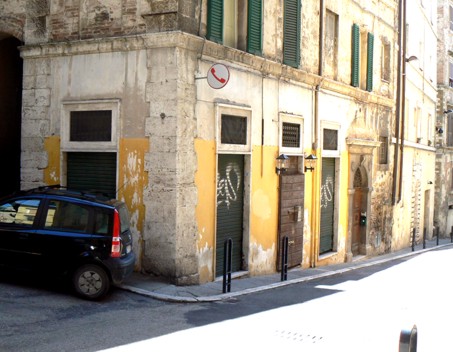
Above & below: Patrick’s bar which Knox managed to drive out of business.
1. Explanation of calunnia
Knox was prosecuted by the Republic of Italy, not by Lumumba, on a calunnia charge and her prison sentence was extended when she was found guilty of that.
The charge of calunnia (art. 368) has been commonly translated as “slander” in the English/US media. This translation is incorrect, however, as calunnia is a crime with no direct equivalent in the respective legal systems.
The equivalent of “criminal slander” is diffamazione, which is an attack on someone”Ÿs reputation. Calunnia is the crime of making false criminal accusations against someone whom the accuser knows to be innocent, or to simulate/fabricate false evidence, independently of the credibility/admissibility of the accusation or evidence.
The charges of calunnia and diffamazione are subject to very different jurisprudence. Diffamazione is public and explicit, and is a more minor offence, usually resulting in a fine and only prosecuted if the victim files a complaint, while calunnia can be secret or known only to the authorities. It may consist only of the simulation of clues, and is automatically prosecuted by the judiciary.
The crimes of calunnia and diffamazione are located in different sections of the criminal code: while diffamazione is in the chapter entitled “crimes against honour” in the section of the Code protecting personal liberties, calunnia is discussed in the chapter entitled “crimes against the administration of justice”, in a section that protects public powers.
2. Knox Defense
Knox took the stand for two days during her trial, of course, trying to explain why she did what she did to her kindly former employer.
She only seemed to dig herself in deeper.
3. Patrick’s Win
Now Terni In Rete confirms his government compensation for his several weeks in Capanne and some damaging badmouthing.
CASSATION: EIGHT THOUSAND EUROS FAIR COMPENSATION FOR PATRICK LUMUMBA
February 4th, 2010
By Adriano Lorenzoni
The fourth criminal session of the Court of Cassation has established that the sum of eight thousand Euros is fair compensation for Patrick Lumumba, the Congolese involved in spite of himself in the murder of the English student, Meredith Kercher.
Lumumba was dragged into involvement by Amanda Knox, and precisely because of her statements spent 14 days in prison. Then the elements gathered by the investigators completely exonerated him. For that unjust imprisonment Lumumba had requested damages of 516 thousand Euros.
In the trial for the murder of Meredith Kercher, Amanda Knox was condemned to 26 years imprisonment, her ex-fiancé, Raffaele Sollecito to 25.Knox, precisely for her false accusations against Lumumba, was condemned to the payment of damages of the sum of 50 thousand Euros with an interim award, immediately applicable, of ten thousand Euros. Neither Lumumba nor his lawyer wished to comment on the decision of the Court of Cassation.
Friday, January 29, 2010
Why The Florence Conviction Of Dr Mignini Doesnt Matter Very Much
Posted by Commissario Montalbano
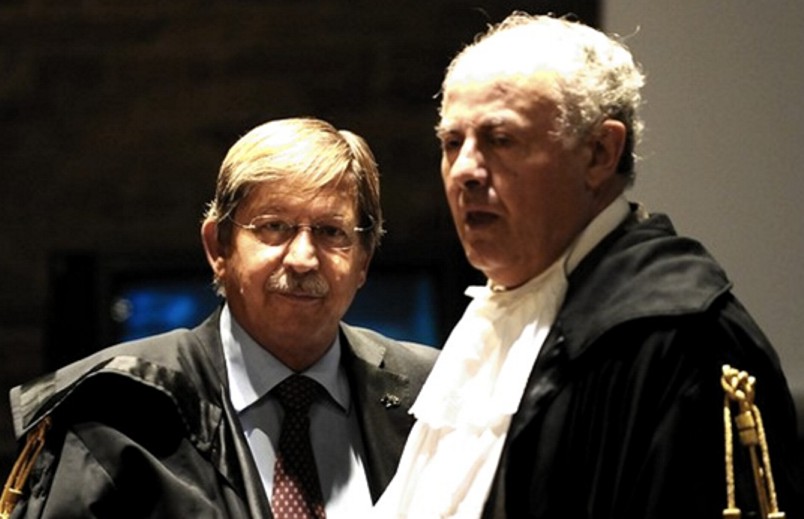
Trial prosecutor Giuliano Mignini with appeal prosecutor Giancarlo Costagliola
1. Background Of The Case
We previously posted on the case here and here.
Dr Francesco Narducci was found dead in Lake Trasimeno, to the west of Perugia, in 1985, and he had been a suspect in the Monster killings.
At first it was presumed to be a regular drowning. However, years later, as a result of some wiretapping for unrelated extortion cases, and thanks to some anonymous claims that Narducci was part of a satanic sect which had commissioned the monster’s killings, and had been killed by members of the same sect, the prosecutor in charge (Mignini) reopened the Narducci case.
The monsters’ modus operandi was to kill courting couples and to cut off the left breast and the genital area of the woman killed using a scalpel, which is why doctors tended to be suspected at the time.
The body was exhumed in 2002 and they found during the new autopsy (no autopsy was done back in 1985) that he might have been drugged and strangled in fact.
There had been some investigations following that autopsy finding dating back to 2004, and apparently some turf wars between the prosecutor’s office in Florence (which was in charge of the Monster case) and the one in Perugia (which was now in charge of the Narducci case).
It seems that in spite of an indictment of a pharmacist in Mercatale (the town near Florence where one of the 3 monsters was from) and a dermatologist, the complete mystery of the murders haven’t been solved as yet.
2. Outcome Of First-Level Trial
There were disagreements between Prosecutor Paolo Canessa in Florence, who for murky reasons wanted to bury the case, and Mignini, who thought there was a need to investigate the allegations that there was a sect that was actually commissioning and buying the body parts from the monsters (the actual killers were three friends, all convicted and now passed away).
The Florence prosecutor at the trial, Luca Turco, claimed that Giuttari and Mignini had conducted illicit investigations - which were in fact authorized by a judge - on some police officials and journalists because they were obstructing the investigation into the mysterious death of Francesco Narducci. Turco requested 10 months for Mignini and 30 months for Giuttari.
3. Legal Ramifications Of Provisional Verdict
First of all Article 27 of the Italian constitution says that a defendant is innocent until found guilty with a definitive sentence (i.e. only after the Supreme Court upholds the conviction in the second and last appeal). The appeal prospects of Giuttari and Mignini seem to be strong on both jurisdiction and evidence grounds.
Therefore in the eye of Italian law Mignini is provisionally still innocent until all appeals are exhausted.
Second of all, all sentences of 2 years in prison or under are automatically suspended, even when definitive, if one has no prior conviction. If within the next five years the defendant doesn’t commit any crime, the sentence is totally expunged. If instead he commits another crime than the suspended sentence is also applied, and the defendant has to serve it.
The suspension applies to both the prison term, and also to the interdiction from holding any public offices (which comes automatically with any conviction).
As a result of the above, Mignini will be able to continue his work in the Kercher case with no consequences. This provisional conviction may be exploited by some US media to discredit the Italian justice system further, and in particular this prosecutor and his handling of the Knox investigation as well.
I doubt that will have any effect on the outcome of the Knox/Sollecito appeal case. Although Mignini will give some assistance to the Procuratore Generale in the appeal, his own office is not competent at the appeal level, and therefore Mignini will not be arguing the case in court at the appeal level.
4. Three Levels Of Prosecution
There are 3 separate types of Prosecutor’s offices in Italy, each competent for a certain level of trial.
1st Level: Procura Della Repubblica
This office comprises the Procuratore della Repubblica (State Prosecutor), assisted by various Sostituti Procuratori della Repubblica (Assistant State Prosecutors). Mignini and Comodi are two such Assistants (Sostituti).
This office is competent for arguing on behalf of the State before the Tribunal and before the Court of Assizes (the latter tries serious crimes for which the Penal Code calls for at least 24 years in prison as the maximum sentence)
This Office (Procura della Repubblica), of which Mignini is part, tries only at the first trial level. These magistrates are not the competent offices for representing the State at the appeal level. That tasks falls into the hands of the office below
2nd Level (appeal level): Procura Generale Della Repubblica Presso La Corte D’appello E La Corte D’assise D’Appello
Long name, but the key words are GENERALE and APPELLO. That’s a sort of District Attorney General office before the Courts of Appeals. It’s composed of a Procuratore Generale Della Repubblica (District State Attorney General) assisted by various assistants called Sostituti Procuratori Generali Della Repubblica.
This office is competent for representing the State at the Appeal level both at the Court of Appeals and at the Court of Assizes of Appeals. This is usually argued by the Procuratore Generale himself or sometimes he might delegate his Sostituti (Assistants).
The prosecutor’s offices explained above are present in each district (basically each province) and they present the cases for which they are competent before the courts and tribunals in their districts.
Third level: Procuratore Generale Presso La Suprema Corte Di Cassazione
If the case reaches the Supreme Court of Cassation, located in Rome, there will be another prosecutor representing the State before that court:
That’s the State Prosecutor General before the Supreme Court of Cassation. His office is in the Courthouse of Rome. He’s also one of the ‘de jure’ members of the Consiglio Superiore della Magistratura
He will be the one arguing the case before the Supreme Court. Of course he has assistants as well. The office above is the only one in Italy, and as just mentioned it’s located in Rome.

